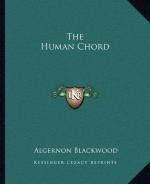“Where I need the assistance of some one with a definite quality of voice—a man who emits a certain note—a certain tenor note.” He released his beard, so that it flew out with a spring, at the same moment thrusting his head forward to drive home the announcement effectively.
Spinrobin crossed his legs with a fluttering motion, hastily. “As you advertised,” he suggested.
The clergyman bowed.
“My efforts to find the right man,” continued the enthusiast, leaning back in his chair, “have now lasted a year. I have had a dozen men down here, each on a month’s trial. None of them suited. None had the requisite quality of voice. With a single exception, none of them could stand the loneliness, the seclusion; and without exception, all of them were too worldly to make sacrifices. It was the salary they wanted. The majority, moreover, confused imagination with fancy, and courage with mere audacity. And, most serious of all, not one of them passed the test of—Miriam. She harmonized with none of them. They were discords one and all. You, Mr. Spinrobin, are the first to win acceptance. The instant she heard your name she cried for you. And she knows. She sings the soprano. She took you into the chord.”
“I hope indeed—” stammered the flustered and puzzled secretary, and then stopped, blushing absurdly. “You claim for me far more than I should dare to claim for myself,” he added. The reference to Miriam delighted him, and utterly destroyed his judgment. He longed to thank the girl for having approved him. “I’m glad my voice—er—suits your—chord.” In his heart of hearts he understood something of what Mr. Skale was driving at, yet was half-ashamed to admit it even to himself. In this twentieth century it all seemed so romantic, mystical, and absurd. He felt it was all half-true. If only he could have run back into that great “mental prairie” of his boyhood days it might all have been quite true.
“Precisely,” continued Mr. Skale, bringing him back to reality, “precisely. And now, before I tell you more, you will forgive my asking you one or two personal questions, I’m sure. We must build securely as we go, leaving nothing to chance. The grandeur and importance of my experiments demand it. Afterwards,” and his expression changed to a sudden softness in a way that was characteristic of the man, “you must feel free to put similar questions to me, as personal and direct as you please. I wish to establish a perfect frankness between us at the start.”
“Thank you, Mr. Skale. Of course—er—should anything occur to me to ask—” A momentary bewilderment, caused by the great visage so close to his own, prevented the completion of the sentence.
“As to your beliefs, for instance,” the clergyman resumed abruptly, “your religious beliefs, I mean. I must be sure of you on that ground. What are you?”
“Nothing—I think,” Spinrobin replied without hesitation, remembering how his soul had bounced its way among the various creeds since Cambridge, and arrived at its present state of Belief in Everything, yet without any definite label. “Nothing in particular. Nominally, though—a Christian.”




